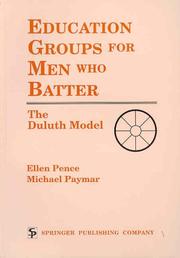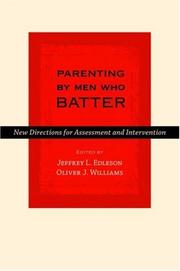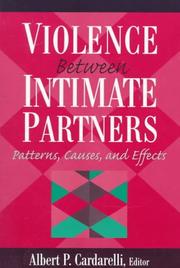| Listing 1 - 10 of 82 | << page >> |
Sort by
|

ISBN: 0826179908 9780826179906 Year: 1993 Publisher: New York: Springer,
Abstract | Keywords | Export | Availability | Bookmark
 Loading...
Loading...Choose an application
- Reference Manager
- EndNote
- RefWorks (Direct export to RefWorks)
Pence and Paymar are right on target again. Their analysis of battering is excellent and their approach...is straightforward, useful and clear. [The book] tells you what to do with abusive men and how to do it well. [The authors] challenge practitioners to do their work in a manner that is compassionate yet never colluding. Accountability and safety to battered women and creating a process of change for abusive men are central to its success.--Susan Schechter,author of Women and Male Violence"Drawing upon years of experience...Pence and Paymar have written a practical and conceptually sound curriculum for batterers' groups. This book offers an effective guide to both the beginning facilitator and the experienced clinician for engaging batterers in the lifelong process of changing their intimate relationships, from those based on coercive control to those based on equality. [They] accomplish this task without compromising their commitment to advocacy with battered women."--Anne L. Ganley, PhD, Domestic Violence ProgramSeattle Veterans Administration Medical CenterPresents the most comprehensive and successful methods for working with men who batter. Mixing discussion, self-analysis and opportunities for learning new behaviors, this well-mapped-out intervention strategy helps counselors hold men accountable while teaching non-abusive behaviors."--Fernando Merderos,Executive Director of Common Purpose, Boston, MAEducation Groups for Men Who Batter is a curriculum and a methodology which unequivocally identifies the exercise of violent and coercive tactics against women in intimate relationships as intentional, strategic behavior....[It] is an essential training tool for all actors in the justice and human services systems. Only when tactics of control are seen as intentional intimate terrorism can these systems construct responses effectively to end the violence."--Barbara J. Hart,Esq., Pennsylvania Coalition Against Domestic ViolencePresents the leading approach to undoing men's abuse of women...The Duluth Model has pioneered an approach based on the experiences of abused women and consequently tailored to their circumstances. It tackles the social dimensions of woman abuse more directly and decisively than any of the psychological or skill-building approaches circulating in the field."-- Edward W. Gondolf,author of Men Who Batter, Battered Women as Survivors, and Psychiatric Response to Family Violence"The Duluth Model has inspired activists all over the world, and its principles are being followed in programs in several countries. We predict that this book will become the standard text for those who work with men who batter."--Rebecca Emerson Dobash and Russell P. Dobashauthors of Violence Against Wives; Women, Violence and Social Change; and Women Viewing Violence
Book
ISBN: 1433808218 Year: 2010 Publisher: Washington, District of Columbia : American Psychological Association,
Abstract | Keywords | Export | Availability | Bookmark
 Loading...
Loading...Choose an application
- Reference Manager
- EndNote
- RefWorks (Direct export to RefWorks)
Book
ISBN: 0415889014 9780415889018 Year: 2012 Publisher: New York, NY: Routledge,
Abstract | Keywords | Export | Availability | Bookmark
 Loading...
Loading...Choose an application
- Reference Manager
- EndNote
- RefWorks (Direct export to RefWorks)
Created to be used as a workbook by men in domestic violence group counseling, this book presents a solid, interactive, and comprehensive treatment tool. If you are a group leader, this guide will provide you with a supplement to your group instruction. Like the previous editions, it is designed to be used with a wide variety of accepted curricula for domestic violence intervention programs. Interactive lessons and exercises cover important topics such as respect and accountability, maintaining positive relationships, good communication, parenting, and the role of religion in recovery. For this new edition, the authors used feedback from group leaders and participants to update, remove, and adjust exercises, and to design new ones. A chapter on the role of drugs and alcohol in domestic violence has been added, as well as new "tool" exercises that will help group members learn new skills and modify and apply them to their lives. If you are a group member, you will find this book to be a valuable supplement to the work you do in group. In it, personal stories from men who were in a group just like you will show you how they have both found success and failed, giving you the opportunity to learn from both. Interactive exercises will enhance your participation in group, and homework assignments will allow you to continue your learning outside of group. Additionally, new "tool" exercises will teach you new skills and how you can apply them in your life.
Family violence --- Marital violence --- Abusive men --- Abusive men --- Group psychotherapy
Book
Year: 2009 Publisher: Copenhagen : Nordic Council of Ministers,
Abstract | Keywords | Export | Availability | Bookmark
 Loading...
Loading...Choose an application
- Reference Manager
- EndNote
- RefWorks (Direct export to RefWorks)
Abusive men --- Women --- Abuse of
Book
ISBN: 9780252075582 9780252033582 0252033582 0252075587 Year: 2008 Publisher: Urbana (Ill.) University of Illinois Press
Abstract | Keywords | Export | Availability | Bookmark
 Loading...
Loading...Choose an application
- Reference Manager
- EndNote
- RefWorks (Direct export to RefWorks)

ISBN: 0195309030 9780195309034 Year: 2007 Publisher: Oxford ; New York : Oxford University Press,
Abstract | Keywords | Export | Availability | Bookmark
 Loading...
Loading...Choose an application
- Reference Manager
- EndNote
- RefWorks (Direct export to RefWorks)
What is the best way to work with fathers who have a history of abusive behavior? This question is among the thorniest that social service and criminal justice professionals must deal with in their careers, and in this essential new work Jeffrey L. Edleson, Oliver J. Williams, and a group of international colleagues examine the host of equally difficult issues that surround it. Beginning with the voices of mothers and fathers who speak about men's contact with and parenting of their children, the authors then examine court and mental health services perspectives on how much involvement violent men should have in their children's lives. The second half of the book showcases programs such as the Boston-based Fathering After Violence initiative and the Caring Dads program in Canada, which introduce non-abusive parenting concepts and skills to batterers and have developed useful guidelines for intervention with these fathers. Visionary but also practical, Parenting by Men Who Batter distills the most relevant policy issues, research findings, and practice considerations for those who coordinate batterer programs or work with families, the courts, and the child welfare system. It guides professionals in understanding men who batter, assessing their parenting skills, making decisions about custody and visitation, and modeling treatment programs that engage fathers in their children's lives while maximizing safety.
Abusive men --- Family violence. --- Parenting. --- Counseling of.

ISBN: 0023192135 Year: 1997 Publisher: Boston Allyn and Bacon
Abstract | Keywords | Export | Availability | Bookmark
 Loading...
Loading...Choose an application
- Reference Manager
- EndNote
- RefWorks (Direct export to RefWorks)
Book
Year: 2005 Publisher: [Washington, D.C.] : U.S. Dept. of Health and Human Services, Office of the Assistant Secretary for Planning and Evaluation,
Abstract | Keywords | Export | Availability | Bookmark
 Loading...
Loading...Choose an application
- Reference Manager
- EndNote
- RefWorks (Direct export to RefWorks)
Child abuse --- Abusive men --- Child molesters
Book
Year: 2005 Publisher: [West Hartford, Conn.] : University of Connecticut School of Social Work,
Abstract | Keywords | Export | Availability | Bookmark
 Loading...
Loading...Choose an application
- Reference Manager
- EndNote
- RefWorks (Direct export to RefWorks)
Abusive men --- Family violence --- Recidivism --- Evaluation. --- Prevention.
Book
Year: 2008 Publisher: Gaithersburg, MD : U.S. Department of Health and Human Services, Administration for Children and Families, Office of Family Assistance, National Responsible Fatherhood Clearinghouse,
Abstract | Keywords | Export | Availability | Bookmark
 Loading...
Loading...Choose an application
- Reference Manager
- EndNote
- RefWorks (Direct export to RefWorks)
| Listing 1 - 10 of 82 | << page >> |
Sort by
|

 Search
Search Feedback
Feedback About UniCat
About UniCat  Help
Help News
News